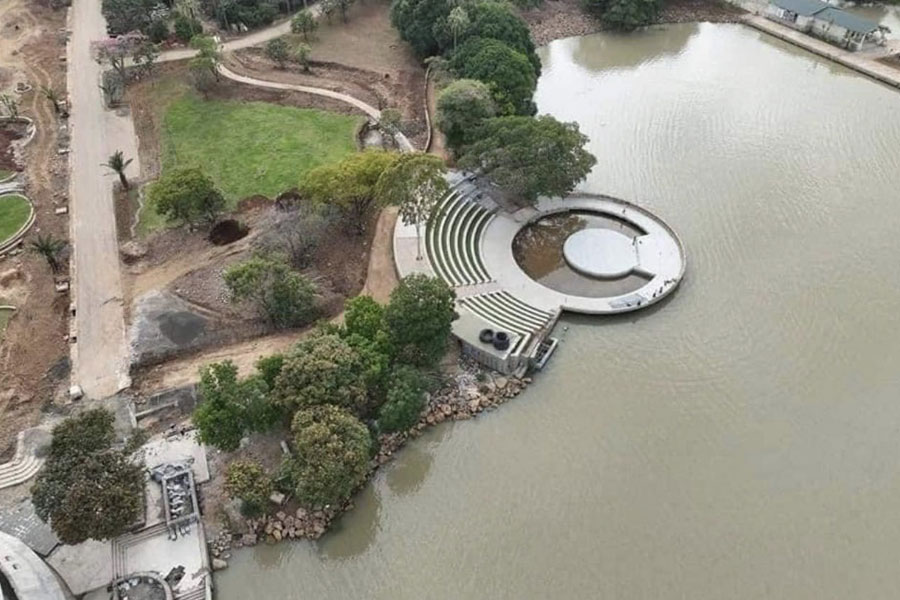
Jan 18 , 2020
By ELIAS TEGEGNE ( FORTUNE STAFF WRITER )
Amid a shortage of trucks to transport imported goods between the port and the country, two ships that carry fertiliser for the coming farming season arrived at the Port of Djibouti.
Fifty-thousand tonnes of urea fertiliser arrived at Djibouti on January 7, 2020, while the second batch of 52,000tn arrived on January 15. The third batch is expected to reach the port on January 26, 2020.
The fertiliser is transported from the ports of Morocco, China, the United Arab Emirates (UAE) and Egypt at a cost of 42 million dollars. DHL Global and Diamond Shipping companies had signed a charter agreement with Ethiopian Shipping & Logistics Services Enterprise to carry the fertiliser to the Djibouti port.
The agreement between the parties states that most of the fertiliser would reach Djibouti in December 2019. Then it would be distributed to unions and users by June. It will be distributed to five regional states, out of which Oromia, Amhara and Tigray will get the highest portion.
However, the Enterprise faced challenges in distributing the fertiliser due to a shortage of warehouses and trucks, according to Roba Megersa, CEO of the Enterprise, which expects five ships to arrive monthly. It needs 50 trucks to transport the fertiliser from each ship.
The Enterprise needs as high as 110,000 warehouses to stock the product. The 120Km-long, damaged highway on the Ethio-Djibouti road is also another challenge to transport the fertiliser into the country.
To transport the imported fertiliser, 14 freight forwarder companies won contracts. The transportation in total needs 2,600 vehicles. The country has 13,000 operational heavy trucks.
The Enterprise plans to mobilise at least 250 vehicles a day to transport all the fertiliser in seven months. Apart from the trucks, the Enterprise is exploring the option of using the Ethio-Djibouti railway to transport the fertiliser.
So far, 30,000tn of fertiliser has already reached the port in the transportation process, according to Roba.
Two weeks ago, Aboubaker O. Hadi, chairperson of Djibouti Ports & Freezone Authority, was in Addis Abeba to hold a discussion with Dagmawit Moges, minister of Transport, and Roba.
The agenda of the meeting was delivering fertiliser before the winter season arrives, according to Roba.
"The discussion was on how to resolve the interruption, which previously occurred when delivering wheat, fertiliser and such products from Djibouti port," said Roba.
Ethiopian authorities state that the volume of imported goods through the port has increased by 30pc compared to last year.
"We're committed to delivering the fertiliser to the farmers before Kiremt," Aboubaker tweeted, adding that the team at the port was ordered to discharge a minimum of 4,000tn of fertiliser a day with an average truck turnaround time of 57 minutes.
After the discussion between the two parties, the Authority agreed to maintain 20Km of the damaged road and started negotiations to use Tadjoura port as an option, according to Roba.
During the meeting, Aboubaker expressed his concerns about a lack of logistics facilities in lifting fertiliser from the harbour on time.
The Enterprise is working with the national bank to solve the forex issue, but it has a long way to go before securing the currency as planned.
Mentesenot Asnake, deputy manager of Impact Logistics Plc, commented that it will be difficult to move all the fertiliser with only the 14 freighters.
"It is expected that the Enterprise will force other freight associations to transport the fertiliser," he said.
Mentesenot urged the government to transport the fertiliser as quick as possible to avoid the fertiliser languishing at the port, saying the effect could be very serious.
He also added that if the fertiliser is not loaded from the port quickly, it will have an effect on other imported products, since the fertiliser always gets priority, leading the remaining items to accumulate at the port.
"It will subject the importers to demurrage costs and container rental fees, which in the end would be paid by consumers," he said, "having a direct impact on inflation."
If a shortage of trucks occur, all of the vehicle associations in the country have the duty of transporting the fertiliser with the same price as the contracted parties, according to Roba.
The other main problem Roba mentioned is a foreign currency shortage, which he says the Enterprise is working on with banks to resolve.
"There is lack of coordination in the process," he said.
PUBLISHED ON
Jan 18,2020 [ VOL
20 , NO
1029]

Dec 22 , 2024 . By TIZITA SHEWAFERAW
Charged with transforming colossal state-owned enterprises into modern and competitiv...

Aug 18 , 2024 . By AKSAH ITALO
Although predictable Yonas Zerihun's job in the ride-hailing service is not immune to...

Jul 28 , 2024 . By TIZITA SHEWAFERAW
Unhabitual, perhaps too many, Samuel Gebreyohannes, 38, used to occasionally enjoy a couple of beers at breakfast. However, he recently swit...

Jul 13 , 2024 . By AKSAH ITALO
Investors who rely on tractors, trucks, and field vehicles for commuting, transporting commodities, and f...

Oct 4 , 2025
Eyob Tekalegn (PhD) had been in the Governor's chair for only weeks when, on Septembe...

Sep 27 , 2025
Four years into an experiment with “shock therapy” in education, the national moo...

Sep 20 , 2025
Getachew Reda's return to the national stage was always going to stir attention. Once...

Sep 13 , 2025
At its launch in Nairobi two years ago, the Africa Climate Summit was billed as the f...